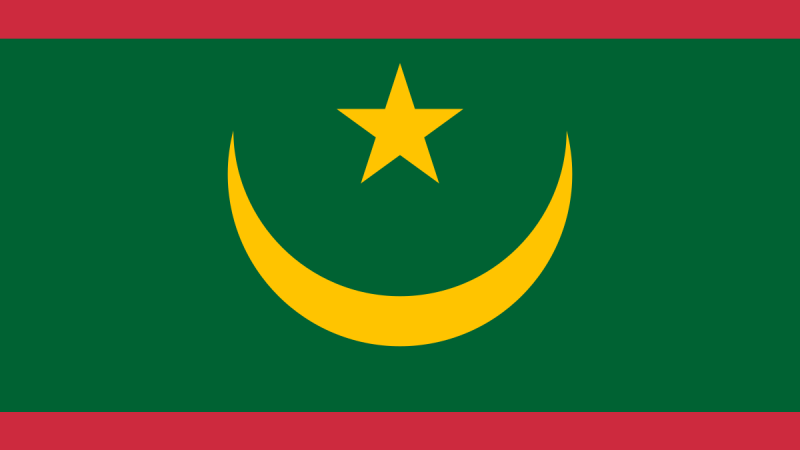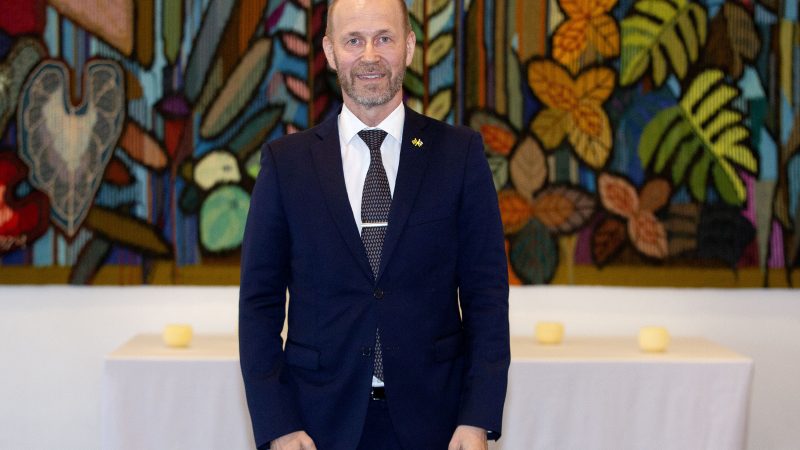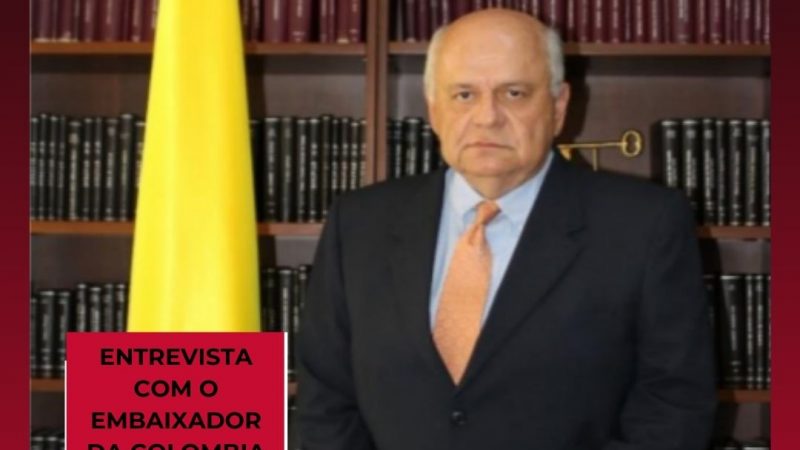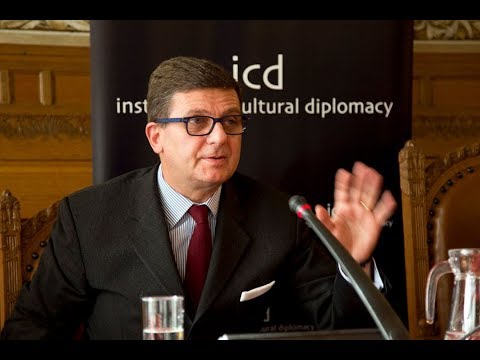Entrevista com o Embaixador da África do Sul no Brasil, V. Ex.ª Mavimbela
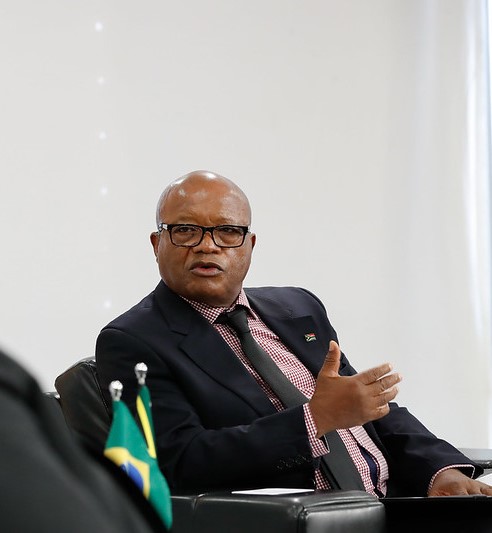
O Dois Níveis tem a honra de apresentar aos seus leitores entrevista exclusiva do site com o atual Embaixador da África do Sul no Brasil, V. Ex.ª Vusumuzi Wellington Mavimbela. Durante a entrevista, foram tratados diversas temáticas de política externa deste que é um dos principais parceiros diplomáticos do Brasil no sistema internacional. O embaixador Mavimbela discorreu sobre a importância do BRICS como instituição e das relações bilaterais sul-africanas com cada um dos membros, tratou sobre o Fórum IBAS, que reúne a África do Sul, a Índia e o Brasil, além de tratar de assuntos relevantes para a integração regional africana, acesso à vacinas e o relacionamento diplomático bilateral com o Brasil.
Agradeço não só à Embaixada, como à V. Ex.ª Embaixador Mavimbela que tornou essa entrevista possível e nos agraciou com tamanho conhecimento. Agradeço também aos meus colegas do Dois Níveis, em especial os colunistas do 2N Entrevistas, assim como a Mauriceia de Oliveira e Denisha Reddy, ambas da Embaixada da Áfricad o Sul, que interceram e tornaram possível a entrevista. Gostaríamos de informar que o Embaixador preferiu o idioma inglês para a concessão da entrevista.
________________
Dois Níveis has the honour to publish for our readers an exclusive interview with the current South African Ambassador in Brazil, H.E. Vusumuzi Wellington Mavimbela. In this interview, it had been discussed several topics of foreign policy, since South Africa is one of the main Brazilian diplomatic partners in the international system. Ambassador Mavimbela discoursed about the importance of BRICS as an institution and South African relationship with each BRICS member, as so as about IBAS Forum, which gets together South Africa, India and Brazil, besides to talk about relevant matters for African regional integration, in addition to vaccines access and bilateral diplomatic relationship with Brazil.
I’m thankful for the Embassy and the Ambassador who made this interview possible -Ambassador Mavimbela graced us with so much knowledge. I’m also thankful for my Dois Níveis colleague, specially 2N Entrevistas columnists, as so as for Mauriceia de Oliveira and Denisha Reddy, both from the South African Embassy in Brazil, who interceded and make this interview possible. We would also like to inform our readers that the Ambassador preferred English for the occasion of this interview.
________________
Dois Níveis: Even before South Africa joined BRICS, the country had established good diplomatic relationships with BRICS. With Brazil, South Africans did develop technical cooperation in military and health matters during the 2000s. In 2000, it had negotiated a bilateral treaty between Russians and the South Africans, which was signed in President Putin’s trip to Cape Town. Finally, South Africa had received Mahatma Gandhi in 1948, where he initiated his political activities. Since the end of the Apartheid regime, the India-South African relationship has been solid. Therefore, how do you, Mr Ambassador, consider those good historical bilateral relationships to South Africa joining BRICS, and later, to its success?
Ambassador Mavimbela: For South Africa, the BRICS partnership is complementary to our strong bilateral relations with each BRICS member, including Brazil. Without any doubt, the close friendship between our countries has made it possible to bridge our different philosophical and ideological backgrounds and find common areas in which to cooperate. This is why BRICS has been functioning well since its inception and we now cooperate not only at government level, but with business, academics, labour and civil society. BRICS is now a fully recognised, maturing quintilateral organisation established with common values and developed with common aspirations.
The overlapping nature of our histories brings the BRICS countries together. This history distinguishes the BRICS countries from the traditional powers. It is a history of struggle against colonialism, exploitation and underdevelopment in the spirit of Bandung, as expressed in the first ever Asia-Africa Conference in 1955. We also cooperate at multiple levels with the developed world, but BRICS arose from a particular opportunity we saw in cooperating in this particular format, which has already borne fruit.
As emerging and developing nations, we also have common challenges that are not shared by the developed world and these bring us together. In South Africa, we refer to the triple challenges of inequality, poverty and unemployment. South Africa has set in motion processes to grow our economy and expand our infrastructure, among other priorities. Our BRICS partners are dealing with similar challenges that differ in scale and degree, but not in essence.
South Africa’s membership of BRICS also strengthens the strategic connection between Africa and BRICS, for instance by ensuring that issues of peace, security and sustainable development in Africa have a definitive place on the BRICS agenda.
BRICS’ successes stand to contribute to the future direction of the global political economy. Therefore, we continue to strengthen our intra-BRICS relations, based on the imperative that cooperation should be mutually beneficial across all pillars of our cooperation. The most visible part of our cooperation is the New Development Bank (NDB). We particularly welcome the role of the Bank in supporting BRICS countries to address the health and economic consequences of the COVID-19 pandemic, including by way of the US$1 billion Emergency Assistance Programme for BRICS members.
Dois Níveis: On 16 September 2020, IBSA Forum released a Joint Ministerial Statement on Reform of the United Nations Security Council. On the other hand, the last IBSA Forum Summit happened in 2011, the same year South Africa participated in its first BRICS summit. How relevant is the IBSA Forum today? Are there any negotiations to bring the Summit back?
Ambassador Mavimbela: The natural political convergence of three like-minded emerging economies, coming from three distinct geo-political regions of the world, resulted in the establishment of IBSA in June 2003 by way of the Brasilia Declaration. Thereafter, the global financial crisis in 2008 catalysed the emergence of the Brazil, Russia, India, China (BRIC) formation in 2009, with South Africa’s membership in 2010 completing BRICS. Many in the international community questioned the relevance of IBSA following the hiatus in IBSA from 2011 to 2017, as the BRICS formation developed substantial momentum.
In October 2017, South Africa hosted the 8th IBSA Trilateral Ministerial Commission (ITMC) in Durban. The outcome of that engagement amongst the three countries was a resounding, consensual agreement that IBSA remained a relevant political voice in the international arena.
The IBSA Foreign Ministers have always maintained close relations, meeting annually in New York on the margins of the UN General Assembly sessions in September.
IBSA has subsequently released over the last three years the following joint statements with a view to influencing the international discourse on key issues:
- A Joint Ministerial Declaration on South-South Cooperation ahead of the BAPA+40 Conference in Argentina in 2018,
- A Joint Ministerial Statement on Strengthened Multilateralism ahead of the 74th UNGA Session in 2019 and
- A Joint Ministerial Statement on UN Security Council Reform ahead of the 75th UNGA session.
The emergence of IBSA in 2003 as a political entity of the Global South brought with it a model of trilateralism that challenged the status quo trilateral cooperation dominated by the North-South paradigm and which continues to be characterised by the OECD-ODA construct. Donor-funding and donor-support have been integral to the traditional lexicon of the developed North, along with the conditionalities and influences that continue to be brought to bear upon donor-recipient countries.
The IBSA Fund has, over the span of fifteen years, successfully promoted all 17 Sustainable Development Goals (SDGs) in 21 partner countries through 27 projects to the approximate value of $35 million. In addition to receiving international awards, the work of the Fund has been recognised by the United Nations as the pre-eminent South-South Funding mechanism and a model for South-South cooperation for the international community to emulate.
In the context of global efforts to contain the spread of the COVID-19 pandemic, most recently the World Health Organisation (WHO) modelled its training programme for its healthcare workers operating in far-flung, remote areas, on an IBSA-funded project health e-learning platform developed for Vietnam’s rural healthcare workers.
IBSA has thus been successful in driving a twin-pronged agenda that addresses systemic and institutional governance challenges, whilst at the same time influencing change at the grassroots level. Its orientation in this regard continues to be people-centred and impact-driven.
Dois Níveis: In front of institutional problems faced in the Organisation of African Unity (OAU), regional leaders released the Sirte Declaration in 1999, Libya, creating the African Union (AU). Later, the Constitutive Act of the African Union was signed in Lomé, Togo. Finally, South Africa held the first AU Summit in Durban, July 2002. How important are the regional integration and African Union on South African foreign policy?
Ambassador Mavimbela: Speaking at the 49th Session of the United Nations General Assembly on 3 October 1994, shortly after his inauguration as South Africa’s first democratically elected Head of State, President Nelson Mandela stated that “We are part of the region of Southern Africa and the continent of Africa. As members of the Southern African Development Community and the Organisation of African Unity, and an equal partner with other member states, we will play our role in the struggles of these organisations to build a continent and a region that will help to create for themselves and all humanity a common world of peace and prosperity”.
Since 1994, cognisant of the intrinsic link between South Africa’s national interests and Africa’s stability, unity and prosperity, we have placed the advancement of the African Agenda at the centre of our foreign policy trajectory. The African Agenda has since grown in scope and depth during the first decade of democracy under the rubric of the “African Renaissance”.
South Africa believes that a strong, united and independent African Union (AU) is instrumental in the realisation of Agenda 2063. Accordingly, South Africa has consistently sought to strengthen Africa’s regional and continental architecture, notably the AU and the Southern African Development Community (SADC) as vehicles for the regeneration of Africa and to build a continent that is free of conflict, poverty and underdevelopment. South Africa has been at the forefront of efforts to strengthen and capacitate both organisations to more effectively address the challenges and opportunities confronting Africa, in an evolving and shifting global geo-political landscape. It is only through collective leadership that we can build a better Africa for all.
Greater African economic integration is of paramount importance to promote peace and stability while addressing trade obstacles, climate change, corruption, cyber- security and to face new global challenges.
We were therefore very pleased when the African Continental Free Trade Area (AfCFTA) came into force on 1 January 2021, under South Africa’s Chairship of the AU. This heralded a new era of intra-African trade and economic integration. AfCFTA establishes a market of over 1.2 billion consumers with a combined GDP of more than US$3.4 trillion and is poised to stimulate intra-Africa trade and investment. The importance of the implementation of the AfCFTA for the prosperity of South Africa, the region and the continent, cannot be overemphasised.
It should also be noted that South Africa continues to utilise its membership and engagements at international fora (such as the UNSC, the G20 etc.) and South-South formations (like BRICS, IBSA, IORA etc.) to advance the African Agenda.
Dois Níveis: The Southern African Customs Union (SACU) is formed by Botswana, Eswatini, Lesotho, Namibia and South Africa. Except for Namibia, they all compose the Common Monetary Area (CMA). South Africa is also the lead investor in those countries. So, how relevant is South African performance toward SACU’s maintenance? Are SACU and CMA important tools of regional integration?
Ambassador Mavimbela: The Southern Africa Development Community (SADC) and the Southern African Customs Union (SACU) are primary vehicles for political and regional economic integration and are important in the promotion of equitable development, sustainable infrastructure development and industrialisation.
Critical to regional economic integration is the rapid implementation of AfCFTA to boost industrial and infrastructure development and enhance intra-regional trade. SADC and SACU are important building blocks to achieve AfCFTA.
As you may be aware, SACU is the oldest functioning customs union in the world. SACU has a common external tariff for imports coming into the common customs area, and goods within SACU circulate freely without any tariffs. SACU collects customs and excise duties from member countries into a revenue-sharing pool, and once a year they share those revenues. The revenues are made up of customs duties that each country collects when they import from outside the bloc and from each other, excise duties and a developmental component. The development component is fixed at 15% of the total excise duties collected and it is inversely proportional to each country’s GDP per capita, so that it is weighted in favour of the less developed member states.
A considerable advantage to all members of the Union is they benefit from negotiating trade deals as a large economic block. SACU has a free trade agreement (FTA) with the European Union Free Trade Association (EFTA), a preferential trade agreement (PTA) with MERCOSUR, a Trade, Investment and Development Cooperative Agreement with the United States (US). SACU countries are currently all eligible beneficiaries of the United States’ African Growth and Opportunity Act (AGOA) and all members (along with Mozambique) are parties to the Economic Partnership Agreement (EPA) with the European Union and the United Kingdom. SACU is currently negotiating an FTA with India.
As the largest, most industrialised and most globally integrated economy in the union, South Africa collects a significant amount of SACU’s revenue and is the hub and first point of entry for most imports. It follows therefore, that South Africa’s economic performance will have a material impact on SACU’s revenue collection and the subsequent annual allocation to member states.
Over the years (pre-Covid), SACU exports to the rest of the world and exports from the other SACU countries’ to South Africa have risen. Thus, we view the trade partnership as mutually beneficial. For our SACU partners, South Africa is a critically important partner in their trade development and they have made a concerted effort to take advantage of the access to the South Africa market and to increase their trade balance within SACU.
Dois Níveis: South Africa joined a few other countries to the waiver proposal of specific TRIPS Agreement sections about intellectual property. Herewith, the country seeks to avoid intellectual property rights to make vaccines accessible globally. Thus, what is the current stage of this proposal? Have there been any advances on this issue?
Ambassador Mavimbela: South Africa firmly believes that international mobilisation, solidarity and cooperation are necessary to beat the Covid-19 pandemic. As the Director-General of the World Health Organisation (WHO) has stated, “We can only end the pandemic anywhere, if we end it everywhere”.
For us to achieve this, it is necessary to have a temporary waiver of certain provisions of the Agreement on Trade-Related Aspects of Intellectual Property Rights (TRIPS) to allow for a more efficient response to the COVID-19 pandemic.
South Africa and India submitted a proposal for a Trade-Related Aspects of Intellectual Property Rights (TRIPS) Waiver on 2 October 2020. The proposal is co-sponsored by 60 Members of the WTO and supported by over 100 members of the WTO, 175 Former Heads of State and Nobel Laureates, with a growing number of Members of Parliaments, medical personnel and citizens across the world. In February this year, all the countries in the African Union formally supported the Waiver request.
This initiative is an attempt to address inter alia, what has been called “vaccine apartheid” i.e. the gaping disparity between rich and poor nations’ access to coronavirus vaccines. The proposal is for a temporary, time-bound, proportional and targeted waiver that does not imply any change of the substantive obligations in the TRIPS treaty. The Waiver will thus allow many countries with vaccine manufacturing capacity to start producing their own vaccines by waiving intellectual property rights.
The most important development in recent weeks was the announcement by the United States to support the waiving of intellectual property protections for COVID-19 vaccines and further, to actively participate in text-based negotiations at the WTO. Following that decision, New Zealand and China also announced their support for the Waiver.
I was very pleased to see that Brazil’s Senate recently approved a bill to suspend patent protection for COVID-19 vaccines, tests and medications during the pandemic and has now sent the proposal to the lower house of Congress for consideration and possible amendment. This is a very welcome development.
Speaking at the Global Health Summit, jointly hosted by the G20 Chair, Italy, and the European Commission on 21 May 2021, Brazilian Foreign Minister, Carlos França commended WHO for its work during the pandemic and for making vaccines accessible through mechanisms such as the Access to COVID19 Tools Accelerator (ACT-A) and COVAX. He also indicated that Brazil is still studying the possibility of contributing to the other pillars of ACT-A.
As you may be aware, South Africa’s President. H.E. Cyril Ramaphosa, and the Prime Minister of Norway, H.E. Ms Erna Solberg, were appointed as the co-chairs of the ACT-A High-level Facilitation Council in September 2020, and South African and Brazilian diplomats have since undertaken several joint outreach initiatives in an attempt to overcome the ACT-A’s financing gap. All G20 members, including Brazil, have been encouraged to make a contribution to this important programme.
Dois Níveis: Brazilian diplomatic relationship with South Africa is defined as a strategic partnership. How do you, Mr Ambassador, analyze the current bilateral relationship?
The bilateral relationship is very healthy and on a solid footing to becoming a very vibrant one. Unfortunately, Covid19 brought many campaigns, projects and plans to a halt, most notably, the celebration of the 10th Anniversary of the signing of the Strategic Partnership in 2020. President Cyril Ramaphosa and President Jair Bolsonaro have had a number of engagements since 2019. One of the most important outcomes of the bilateral meeting of our Heads of State in Brasilia in November 2019 was a decision to anchor our relationship on Agricultural cooperation, and in particular, through a commitment “to cooperate rather than to compete”. This commitment will underscore my mission in Brazil.
Our Foreign Ministers held a virtual meeting on 20 December 2020 wherein they took stock of the current status of our relations and agreed on the broad areas of cooperation (namely, agriculture, defence, infrastructure and energy – biofuels and ethanol) and also reached an understanding on the need for an expeditious review of sanitary and phytosanitary measures in order to improve the current levels of bilateral trade and economic cooperation.
This meeting has set the tone for a dynamic renewal of relations between our countries. Minister Carlos França has now invited his South African counterpart, Minister Naledi Pandor to co-chair the next session of the South Africa-Brazil Joint Commission – to be held in Brasilia in August 2021. This meeting will provide an opportunity for the signing of outstanding agreements, and is also expected to develop a framework agenda for bilateral relations over the next few years.
Dois Níveis: What are your perspectives to increase the diplomatic relationship between South Africa and Brazil in the future
I am especially passionate about expanding people-to-people relations, including in the areas of music, tourism, culture, sports and academia. Brazil is a beautiful and diverse country with deep cultural, historical and ethnic ties with the African Continent. It is important that we take advantage of this strong bond between our people.
Cooperation in science, technology and innovation is another area where there is keen interest from both sides and a new bilateral agreement is expected to be signed on the margins of the Joint Commission meeting in August 2021. The Space Agencies of both countries recently signed a MoU on Cooperation and there are plans underway for virtual seminars to bring together space industry actors from both countries.
Increasing tourism to South Africa is always a priority for us given that this sector is a major anchor for South Africa’s economic recovery. As you know, Brazilian tourists can already enter South Africa visa-free for up to 90-days. At the moment a Covid-19 negative PCR test is required. South Africa continues to offer Brazilian tourists exceptional value for money.
One of my priorities during my term in Brazil will be to expose Brazilians to the world’s largest free trade region, the African Continental Free Trade Area (AfCFTA) and in particular the vast opportunities for Brazilian companies to participate in the infrastructure build across the African Continent. I understand that there is significant appetite in Brazil to enter the fast growing African continent, and South Africa stands ready to facilitate this process.
Of course we also continue to cooperate in sub-regional and multilateral organisations like BRICS, IBSA, the G-20 and the United Nations, and within those platforms there is also space to expand on areas of cooperation.

